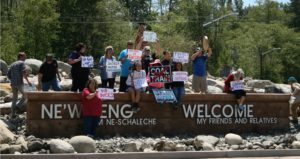If you have come to help me, you are wasting your time.
If you have come because your liberation is bound up with mine,
Then let us work together.
Lilla Watson
Australian Aboriginal elder,
activist, and educator
From operating boarding schools to Standing Rock in 2016, Unitarians, for good and for bad, have had roles to play in a long history of dealings with various indigenous groups throughout the United States and in a number of issues faced by those communities.
Some of Unitarians’ first contacts with native communities included attempts to “educate” Indians, beginning back in 1855. These attempts followed the same pathway as other early Christian-based groups whose focus was assimilating the native populations without regard to the traumatic consequences inflicted on these peoples.
As of 1902, UU historian Rev. George Willis Cooke’s writings stated there were 3 attempts on the part of Unitarians to undertake “educational work amongst the Indians.” One mission was among the Chippewa/Ojbiwa in Minnesota in 1855 that failed due to the lack of funding. In 1871, President Grant assigned to the Unitarians the responsibility of education the Utes on the reservation near White River, Colorado that was attempted in 1885. This attempt failed as well due to “not getting sufficient encouragement.” In 1886, the American Unitarian Association established a boarding school on the Crow reservation in Montana called the “Montana Industrial School for Indians” or “Bond’s Mission School” run by Unitarian Rev. and Mrs. Henry F. Bond.
These early relationships are not ones to make Unitarians proud. However, Unitarians have changed their thinking and have begun walking down a different pathway in its relationships with indigenous communities. Any number of general and business resolutions, actions for immediate witness, responsive resolutions, and a statement of conscience have all been put forward and adopted by the Unitarian Universalist body at-large since at least 1967. Some of these actions can be found at the UUA website.
While these actions have occurred on a national level within Unitarian Universalism, this website will:
- Follow the relationships of local UU individuals, congregations and groups, and their relationships with indigenous communities.
- Contain information necessary to begin understanding Tribal communities’ struggles for survival and our roles within the systematic oppression that has deep roots in our history and institutions.
- Provide resources and opportunities on partnering or working with Tribes and other allies in challenging the myriad of environmental and social justice issues Native and non-Native communities, alike, face.
To engage in this work, we must be willing to look and consider several things.
- First, we need to look at and acknowledge our own participation in the systematic oppression of Native peoples and their cultures. This may mean being confronted with our direct involvement, our apathy or our ignorance.
- Second, we must acknowledge that Tribal communities have a better handle on what the issues are that they face and we must relinquish control and learn to follow their leadership.
- Third, we must understand and approach our relationships as equally impacted by the issues of the day. We are not here to “save the Indian,” or atone for our past actions, but to work together to address the issues that affect all of us, our shared future. Much of our work is rooted in a shared responsibility, whether it is towards the Earth or towards each other.
- Fourth, be committed to the big picture and the long haul. Many of the issues we will be engaged in will have a deep history that needs to be uncovered and understood. The issues are complex and intersect with many other issues and communities. In being extremely complex and intersectional, they will require multifaceted solutions. There can be no half-measures if we are to be successful.
Reference: Unitarianism in America: a history of its origin and development, pg 340-341
By George Willis Cooke, American Unitarian Association, Boston, 1902
